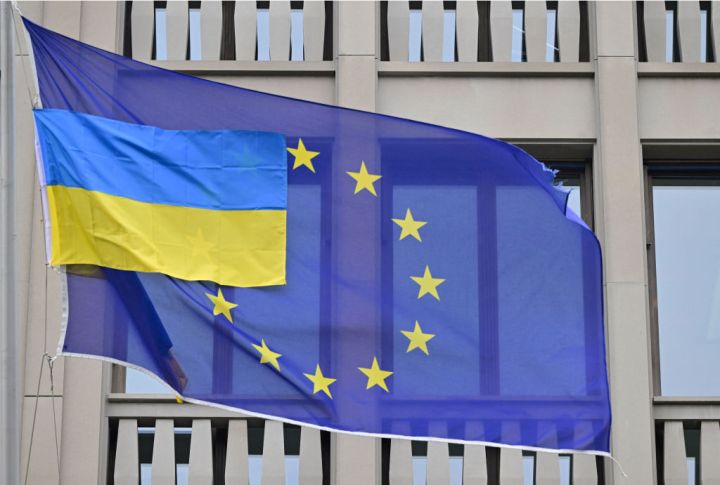
How to join the EU

Expanding the EU. The European Commission recommended Wednesday to expand the European Union. As many as 10 new countries could join, but Ukraine — which was fast-tracked for membership last year after Russia invaded — and Moldova are the frontrunners.
“It’s not only about geopolitics. It’s of course about economics,” said EU Commission President Ursula von der Leyen. “The completion of our union will make the new member states’ economies grow. It will make EU companies grow. It will also make our single market grow, making Europe an even more attractive stronger partner in the global stage.”
This won’t happen overnight. To join the EU, candidate countries must implement often complex reforms that prevent corruption and strengthen democracy and their economy. That means rewriting national laws to align with 40,000 pages of EU laws and standards. The whole process has taken nine years on average, and expansion has largely stalled in recent years. Serbia, Montenegro, Albania and North Macedonia all applied for membership more than a decade ago. The last country to join was Croatia, in 2013.
More members, more challenges? The bigger the group gets the harder it will be to build consensus. Many aspiring EU members like Serbia and Bosnia and Herzegovina already disregard orders from Brussels to follow EU trade and financial sanctions against Russia.
Plus, the EU began removing visa requirements for many Western Balkan nation citizens to enter the bloc in 2009. Free travel was one of the primary motivators for joining, and without that carrot, the high cost of government reforms may outweigh the benefits for many countries.
Smart in a Shot

The worst of the pandemic is far behind us, but we’re still stressed out. That’s according to results from the American Psychological Association’s most recent annual survey. It found higher levels of stress for adults ages 18 to 64 in 2023 compared to pre-pandemic.
The top source of that stress? Money, and many people said that they bear the burden of that stress alone. Only half of respondents were comfortable talking about money. Forty-five percent said they felt embarrassed doing so.
Money got you stressed? Here’s a good listen, an episode of “This Is Uncomfortable” about how one woman worked with a financial therapist to get to the root of her money anxieties.
The Numbers
Research shows students who take financial education courses make smarter decisions about money. That’s why more policymakers and state legislators are moving to mandate personal finance education in public schools. Let’s do the numbers.
38%
That’s the percentage of people who said their lack of financial literacy cost them $500 or more in 2022, according to a National Financial Educators Council survey.
30
The number of states that require students take a personal finance course to graduate high school, up from 23 last year. But some states may be backtracking on teaching economics. That’s too bad, because the two subjects are complementary. The former teaches us how to be smart buyers and savers, while the latter helps us understand how personal financal decisions fit into the bigger picture.
$600,000
As states adopt graduation requirements for financial literacy courses, they must enforce academic standards for the new curriculum.
After Florida mandated financial literacy credits for high school freshmen last year, the state also approved the use of a controversial textbook written by conservative American radio personality Dave Ramsey. Education experts who reviewed the textbook found that it neglected basic math literacy and promoted financial advice like disregarding the need for a credit score. One school district estimated adopting the textbook would cost it $600,000.
48%
In 2023, U.S. adults correctly answered about half of all the questions on a longer version of this personal finance quiz. People are most likely to struggle with questions tied to understanding risk.
None of us is as smart as all of us
Staying put: First there came trend stories about “quiet quitting,” then stories about how hard it is to hire right now. The latest labor supply quandary apparently bothering bosses? Editor Virginia K. Smith is reading a Wall Street Journal article about how lower rates of employee turnover are somehow now the problem.
Durable design: Producer Courtney Bergsieker is reading a Washington Post story about how to sustainably upgrade your winter wardrobe. (Hint: it’s about quality, not quantity.)
Supersized airship: Newsletter writer Ellen Rolfes (hi) recommends this TechCrunch article about the Pathfinder 1, a prototype airship that began test flights this week. It’s three times the size of a Boeing 737, can carry up to four tons of cargo and uses helium and electric motors to stay up in the air.
There’s a lot happening in the world. Through it all, Marketplace is here for you.
You rely on Marketplace to break down the world’s events and tell you how it affects you in a fact-based, approachable way. We rely on your financial support to keep making that possible.
Your donation today powers the independent journalism that you rely on. For just $5/month, you can help sustain Marketplace so we can keep reporting on the things that matter to you.











